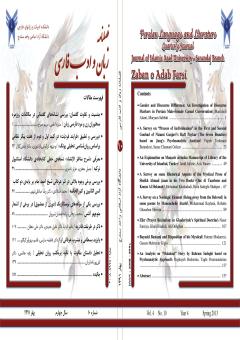چندگانگی هویت: چالشها و فرصتهای مهاجرت در «خاک غریب» اثر جومپا لاهیری
محورهای موضوعی : نقد ادبی و نظریه پردازی
فرانک شاهمرادی
1
![]() ,
بهمن زرین جویی
2
*
,
لیلا برادران جمیلی
3
,
بهمن زرین جویی
2
*
,
لیلا برادران جمیلی
3
1 - گروه زبان و ادبیات انگلیسی، واحد بروجرد، دانشگاه آزاد اسلامی، بروجرد، ایران
2 - گروه زبان و ادبیات انگلیسی، واحد بروجرد، دانشگاه آزاد اسلامی، بروجرد، ایران. نویسنده مسئول
3 - گروه زبان و ادبیات انگلیسی، واحد بروجرد، دانشگاه آزاد اسلامی، بروجرد، ایران.
کلید واژه: چندگانگی هویت, خاک غریب, چالش, فرصت, جومپا لاهیری, مهاجرت,
چکیده مقاله :
عصر جهانی شدن، فراملیگرایی و تغییرات اجتماعی-فرهنگی موجب بروز چندگانگی هویت در ادبیات دیاسپورایی قرن بیست و یکم شده است. مفهوم هویت، با پیچیدگیها و ظرایف ذاتی خود، همواره موضوعی مورد بررسی و کنکاش در مطالعات فرهنگی بوده است. جومپا لاهیری یکی از صدایهای قوی هویت چندگانه هندی در آمریکا است. وی در دومین مجموعه داستان خود، «خاک غریب» (۲۰۰۸)، به بررسی چندگانگی هویت افرادی میپردازد که درگیر چالش میان فرهنگ، خانواده و جامعه میباشند. این مقاله با استفاده از دیدگاههای نظری استوارت هال و مایکل رایان ، به بررسی چگونگی تجربه چندگانگی هویت درخاک غریب اثر لاهیری پرداخته و از طریق تحلیل دقیق برخی از روایتها، به تبیین تعامل پیچیده میان پیشینهی شخصیتها، محیطهای فرهنگی جدید و احساس پیچیدگی هویت آنها میپردازد. در انجام این واکاوی، نقش شخصیتهای لاهیری درچگونگی رویارویی با تنشهای موجود میان میراث فرهنگی بنگالی و هنجارهای فرهنگ غربی مختلف مورد بررسی قرار میگیرد. از سوی دیگر، مهاجرت فرصتهایی را برای شروع زندگی جدید، آموزش و بهبود وضعیت اقتصادی فراهم میکند، اما همزمان با تنشهایی نیز همراه است. این پژوهش در پی پاسخ به این پرسشهای بنیادین است که این چالشها و فرصتها کدامند، در چه حوزه هایی اتقاق افتادهاند و لاهیری چگونه این چالشها و فرصتها را به تصویر کشیده است؟ یافتههای این پژوهش نشان می¬دهند که چگونه هویتهای چندگانه، باعث ایجاد چالشها و فرصتهای بسیاری در مهاجرت می¬شوند که آگاهی از آن برای جوامع جهانی بسیار حائز اهمیت است.
The era of globalization, transnationalism, and socio-cultural transformations has caused the emergence of multiple identities in 21st-century diasporic literature. The concept of identity, with its inherent complexities and subtleties, has always been a subject of research and exploration in cultural studies. Jhumpa Lahiri, a prominent voice of multiple Indian-American identities, explores the notion of identity in her second short story collection, "Unaccustomed Earth" (2008), where she examines the challenges faced by individuals caught between the challenges of culture, family, and society. This paper, using the theoretical perspectives of Stuart Hall and Michael Ryan, investigates the experience of multiple identities in Lahiri's "Unaccustomed Earth." Through a close analysis of some narratives, it elucidates the complex interplay between the characters' backgrounds, new cultural environments, and their sense of complexity. The study examines the role of Lahiri's characters in navigating the tensions between their Bengali cultural heritage and the norms of Western culture. On the other hand, migration can provide opportunities for a fresh start, education, and economic improvement, but it also brings its own set of challenges. This research aims to identify these challenges and opportunities, the domains in which they occur, and how Lahiri has portrayed them. The findings of this study can assist readers in understanding how multiple identities entail both challenges and opportunities in the context of migration, which is a critical consideration for global communities.

